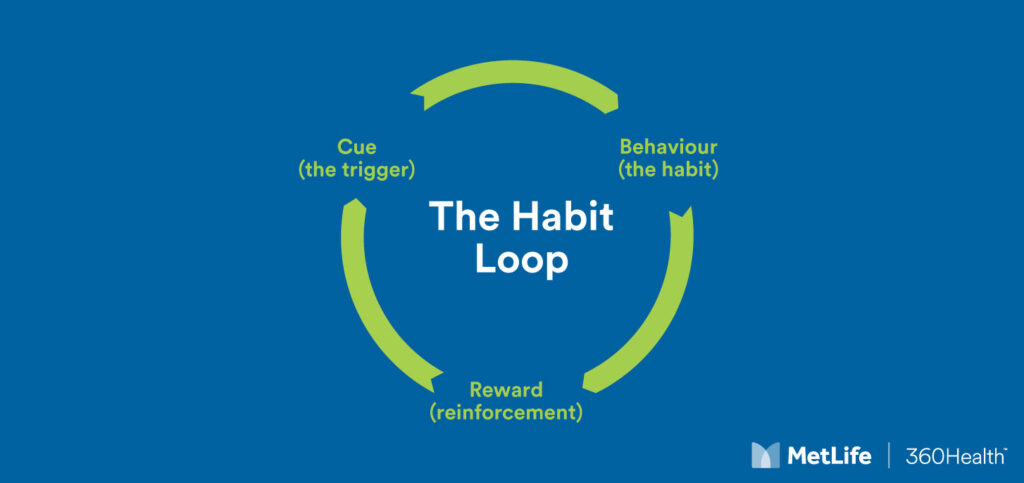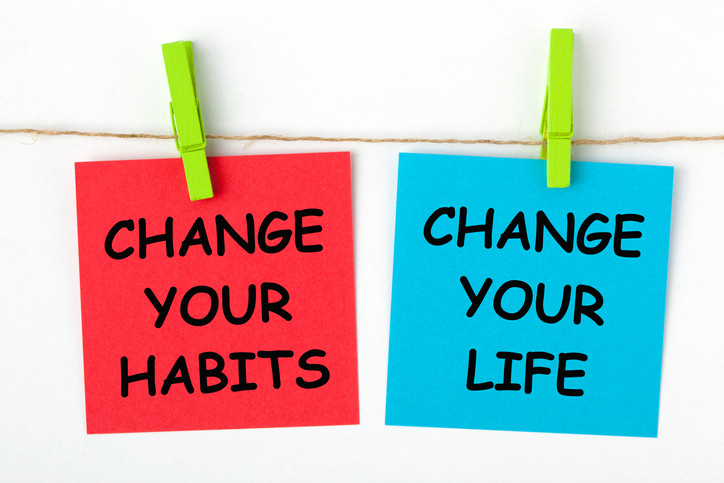In the quest for a healthier and more fulfilling life, the psychology behind our habits plays a pivotal role. Our daily routines are a result of our habits, and by understanding the psychological mechanisms that underlie these habits, we can embark on a transformative journey toward long-term success. This article delves into the intricate workings of our minds, offering insights and practical tips to help you cultivate and sustain healthy habits.
The Power of Habit Formation

Habits are the building blocks of our lives, shaping our behaviors, and ultimately, our destinies. They can either propel us towards success or hold us back in a cycle of stagnation. Understanding how habits are formed is the first step in harnessing their power for positive change.
Cue, Routine, Reward: Charles Duhigg, in his book “The Power of Habit,” elucidates the habit loop: cue, routine, and reward. Cues are triggers that initiate a habit. Routines are the behaviors themselves, and rewards are the positive outcomes we associate with these behaviors. For instance, the cue might be feeling stressed, the routine could be eating junk food, and the reward is a momentary feeling of relief. Recognizing this loop in your own life is crucial for change.
Neuroplasticity: The brain’s remarkable ability to rewire itself, known as neuroplasticity, offers hope for habit transformation. Every time you engage in a habit, the associated neural pathways strengthen. To replace an unhealthy habit with a healthy one, you must consciously create new pathways through repetition and consistency.
Start Small: Trying to overhaul your entire life at once can be overwhelming and counterproductive. Begin with small, manageable changes. Want to establish a workout routine? Start by committing to a 10-minute daily walk and gradually increase the duration. Just like choosing to wear men’s hoodies for a casual day instead of a full suit, it’s all about finding comfort in small adjustments. This approach minimizes resistance and makes the habit more sustainable.
The Role of Motivation
Motivation is the fuel that powers habit change. It’s what gets you out of bed in the morning to exercise or prompts you to choose a salad over fast food for lunch. Understanding how motivation works can help you harness its force for lasting lifestyle changes.
Intrinsic vs. Extrinsic Motivation: Motivation can be categorized into two types: intrinsic and extrinsic. Intrinsic motivation arises from internal desires, like the joy of doing an activity for its own sake. Extrinsic motivation, on the other hand, comes from external rewards or punishments. In the context of habits, intrinsic motivation is more sustainable. It’s the love for running that keeps you going, not the promise of a new gadget.
The Motivation Equation: Psychologist Albert Bandura proposed a model of motivation that considers self-efficacy, outcome expectations, and goal setting. Self-efficacy is your belief in your ability to perform a task. Outcome expectations involve anticipating the results of your actions. Setting specific, achievable goals can boost motivation by making your progress tangible.
Habit Stacking: This technique involves attaching a new habit to an existing one. For example, if you’re trying to incorporate meditation into your daily routine, do it right after brushing your teeth in the morning. The existing habit of tooth brushing serves as a cue for the new habit. Similarly, if you want to spend a few moments each day admiring art tapestries, do it right after a daily activity like having your morning coffee.
Overcoming Common Challenges
Habit formation is not without its challenges. Understanding these obstacles and how to navigate them is essential for success.
The Plateau Effect: In the early stages of habit formation, progress often feels rapid and rewarding. However, there comes a point where it seems like you’re not making any further gains. This is known as the plateau effect. Understanding that this phase is normal can help you push through it.
Self-Doubt and Procrastination: Negative self-talk and procrastination are formidable foes when it comes to habit change. Recognize that self-doubt is a common part of the process. Challenge your inner critic with positive affirmations and remind yourself of your successes.
Accountability and Support: Sharing your goals with a friend or joining a support group can provide the accountability and encouragement needed to stay on track. Knowing that others are cheering for your success can be a powerful motivator. Additionally, having custom shopping bags printed with your goals can be a daily visual reminder and conversation starter with those around you.
Building a Sustainable Habit Ecosystem

Sustaining healthy habits over the long term requires creating an environment that supports your goals.
Environment Design: Make your desired habits easier to perform and undesirable ones harder to access. If you want to read more, place books in visible locations and keep distractions like the TV remote out of sight. Similarly, if you’re looking to stay hydrated and nourished, consider using mobile IV therapy to have essential vitamins and fluids delivered directly to you, making it easier than searching for various supplements.
Social Influence: Surround yourself with individuals who share your goals or admire your desired habits. Social pressure can be a positive force for maintaining your chosen behaviors.
Self-Reflection and Adaptation: Regularly assess your habits and their impact on your life, including how often you consume edible gummies. Be willing to adapt and refine them as needed. What worked for you a year ago may not be the best approach today.
The Science of Habit Maintenance
Sustaining healthy habits over the long term is an intricate science in itself. It involves not just cultivating new habits but also ensuring their permanence in your daily life. In this section, we delve deeper into the science of habit maintenance, exploring additional strategies and insights to keep your newfound routines firmly entrenched.
For example, if you’re struggling to maintain a healthy diet, you might want to consider hiring a meal delivery service or working with a registered dietitian. Or, if you’re having trouble sticking to a regular exercise routine, you could join a fitness class or find a workout buddy. Whatever your individual needs may be, there are many resources available to help you succeed on your journey to a healthier lifestyle. And if you’re looking for ways to save time and money, you can always outsource some of your household chores, such as appliance repair in Washington DC.
Reinforcement and Tracking: Once you’ve initiated a healthy habit, it’s essential to reinforce it regularly. Positive reinforcement can come in various forms, such as acknowledging your progress, celebrating milestones, or using habit-tracking apps. These tools serve as constant reminders of your commitment and can boost your motivation. Additionally, you could treat yourself to a day at a luxury salon in Toronto as a reward for maintaining consistency in your habit.
The Habit Hierarchy: Not all habits are created equal, and some might hold greater significance in your life. Establishing a habit hierarchy can help you allocate your time and energy effectively. Identify your “keystone habits” – those that have a cascading effect on other areas of your life. By prioritizing these keystone habits, you can create a domino effect of positive change.
Mindfulness and Self-Awareness: Developing mindfulness and self-awareness is fundamental for habit maintenance. Mindfulness techniques, such as meditation and journaling, can help you stay in tune with your emotions and behaviors. This self-awareness enables you to detect any deviations from your desired habits early and take corrective action.
The Two-Day Rule: To ensure the continuity of your habits, adopt the “two-day rule.” This rule entails that you never skip a habit for two consecutive days. It acts as a safety net, preventing occasional lapses from turning into full-blown habit abandonment. Consistency is key, just like when you maintain your home by addressing issues promptly, such as roof repair, to prevent larger problems from developing over time.
The Power of Habit Networks
As you continue to nurture your healthy habits, they form intricate networks within your brain. These networks not only support individual habits but also interconnect to create a more profound impact on your life.
Synergy Between Habits: Your habits don’t exist in isolation; they influence and enhance one another. For example, regular exercise can boost your energy levels, making it easier to maintain a healthy diet. Recognizing these synergies can inspire you to cultivate complementary habits.
Mindset Shift: Over time, as your habit networks strengthen, they can lead to a significant shift in your mindset. What initially required conscious effort becomes second nature. You begin to see yourself as a person who exercises daily, eats healthily, and prioritizes self-care. This shift in identity can be a powerful motivator for maintaining your habits. Consider organizing a readathon school fundraiser to promote reading and education, which can be a rewarding habit to instill in young minds and contribute positively to their future identities.
Embracing Variety: While consistency is vital, introducing variety into your habits can prevent monotony and burnout. For instance, if you’ve established a daily reading habit, alternate between genres to keep things fresh and exciting. Variety not only sustains interest but also engages different parts of your brain.
Overcoming Setbacks and Resisting Relapse
Habit maintenance isn’t always smooth sailing. Setbacks and relapses are part of the journey, but they don’t have to derail your progress. Understanding how to navigate these challenges is crucial for long-term success.
The Importance of Forgiveness: When setbacks occur, it’s essential to practice self-compassion and forgiveness. Beating yourself up over a missed workout or an unhealthy meal won’t help. Instead, acknowledge the slip, understand its cause, and recommit to your habit with renewed determination.
Identifying Triggers: Setbacks often have triggers, which can be emotional, environmental, or situational. Identifying these triggers empowers you to proactively address them. For instance, if stress leads to emotional eating, develop alternative coping mechanisms like deep breathing exercises or a quick walk.
Reframing Relapse: Instead of viewing a relapse as a failure, see it as an opportunity to learn and grow. Analyze what led to the relapse and use this insight to fortify your habit strategy. Remember that setbacks are temporary, and your overall progress remains intact. If your company is constantly making mistakes by hiring bad IT companies, you should take the time to find a respected company for managed IT services in San Antonio.
The Ever-Evolving Habit Journey

As you progress along your habit journey, it’s essential to recognize that habits are not static. They evolve with you, your goals, and your life circumstances. Embracing this evolution is key to maintaining long-term success.
Periodic Reviews: Schedule regular habit reviews to assess their relevance and effectiveness. As your life changes, so do your priorities. What served you well in the past may no longer align with your current goals. Adjust your habits accordingly to stay on course.
Setting New Challenges: Once a habit becomes ingrained, it’s natural to seek new challenges. Consider setting higher benchmarks or expanding your repertoire of habits. This keeps your journey exciting and ensures that complacency doesn’t set in. If you have the challenge of buying a new property, consulting a Delray Beach realtor can be a great way to explore the real estate market and find the perfect home.
Sharing Your Journey: Sharing your habit journey with others can be incredibly motivating, both for yourself and those around you. Consider becoming a mentor or coach to help others on their path to habit transformation. Teaching reinforces your own knowledge and commitment. However, if you still need help with things like selling your business, consider working with M&A advisors.
The Habit of Gratitude
In the midst of your quest for healthy habits, don’t overlook one of the most powerful habits of all: gratitude. Cultivating a habit of gratitude can transform your perspective and amplify the positive impact of your other habits.
Daily Gratitude Practice: Dedicate a few moments each day to reflect on the things you’re grateful for. This simple habit can boost your mood, reduce stress, and enhance your overall well-being. It also reinforces a positive outlook that supports your other habits, including finding ways to travel cheap and explore the world without breaking the bank.
Gratitude and Resilience: Gratitude can be a pillar of resilience in the face of challenges. When you’re grateful for the progress you’ve made and the opportunities before you, setbacks become less daunting. Gratitude helps you maintain a long-term perspective on your journey.
Gratitude and Connection: Expressing gratitude to others strengthens social bonds. As you progress on your habit journey, acknowledge and appreciate the support you receive from friends and loved ones. This reinforces your commitment and fosters a sense of community. For example, if a friend helps you prepare a healthy meal or cheeseboard, be sure to thank them and let them know how much their support means to you.
Embracing the Journey
In conclusion, the psychology of healthy habits is a dynamic and multifaceted journey. From habit formation to maintenance, navigating setbacks, and embracing the evolution of your habits, each phase offers valuable insights and opportunities for growth. For example, if you’re looking to get in shape, you might start by making small changes to your diet and exercise routine. As you become more consistent with your new habits, you’ll start to see results. But there will inevitably be setbacks along the way. That’s where it’s important to be kind to yourself and learn from your mistakes. And as your habits evolve, so too will your goals and motivations. The important thing is to keep moving forward and celebrating your successes along the way.
If you’re looking for a way to make your healthy habits journey easier, consider renting a car from Rent a Car Beograd. A car can give you the flexibility and freedom to get around and explore new places, which can help you stay motivated and on track. Plus, renting a car can be a fun and affordable way to experience Belgrade, one of the most vibrant and exciting cities in Europe.
Remember that the path to long-term success is not linear. It’s filled with twists, turns, and occasional detours. Embrace these challenges as part of your transformative journey. With the right mindset, strategies, and a dash of gratitude, you can build a life rich in healthy habits that lead to lasting fulfillment and well-being. Keep moving forward, one habit at a time, and savor the ever-evolving adventure of self-improvement.


